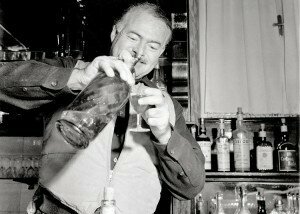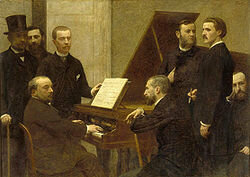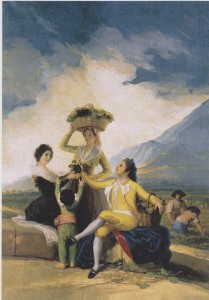
Ernest Hemingway
Let’s merry be this joyful day!
Hang sorrow! Let’s cast care away!
Let us now both sport and play!
Three cheers for the wine, the noble wine,
that joyfully now appears!
Let’s praise the juice divine. All hail to the wine!
Joseph Haydn: The Seasons, “Autumn, Juhhe, juhhe! Der Wein ist da”

Around the piano (Emmanuel Chabrier at the piano)
by Henri Fantin-Latour
Emmanuel Chabrier: “Duetto de la Chartreuse Verte,” L’Etoile
Medieval clergy strenuously warned their flocks about the dangers of drinking. In a sermon from the Middle Ages we read, “First, drink deranges man’s sense; secondly, it alienates the mind; thirdly it excites to shameful and improper things.” Yet these are precisely the virtuous that were enthusiastically celebrated in drinking songs. Many of these songs were composed by students, monks and the clergy, “suggesting that the religious spirit was hardly as pious and dour as it is sometimes imagined.” Juan Ponce (1476-1520) held the chair of humanities at Salamanca University, and while there he composed the four-voice drinking song “Ave color vini clair.” Composed at the beginning of the 16th century, “Hail, to the color of clear wine” celebrates in classic Latin poetry the great sense of elation accorded by a glass or two.
O quam placens in colore, | Oh, how pleasing is your color, |
Or quam fragrans in odore, | and your fragrant smell, |
or quam sapidum in ore, | and how tasty is |
sweet linguae vinculum! | this sweet bond! |

Autumn: The grape harvest by Francisco Goya
© Wikipedia
The outskirts of the city of Vienna are peppered with open-air taverns called “Heuriger.” Taking their name from “this year’s wine,” local winemakers serve their homegrown wine alongside simply foods, and on occasion, a bit of music. Franz Schubert and his friends were frequent visitors to the “Heurigen,” and it predictably inspired a composition or two. Schubert’s Drinking Song, D. 183 dates from 1815 and sets poetry by Alois Zettler. This immediately memorable strophic song delightfully extols the virtues of friends and wine in navigating the troubled waters of life.
Ihr, Freunde, und du, goldner Wein! | You, my friends and you, golden wine, |
Versüßet mir das Leben; | Make my life sweet; |
Ohn’ euch Beglücker wäre fein | Without you I would truly be |
Ich stets in Angst und Beben. | always in a state of anxiety and agitation. |
Ohne Freunde, ohne Wein | Without friends, without wine, |
Möcht’ ich nicht im Leben seyn! | I don’t want to live! |
Franz Schubert: “Ihr Freunde und du gold’ner Wein” D. 183
